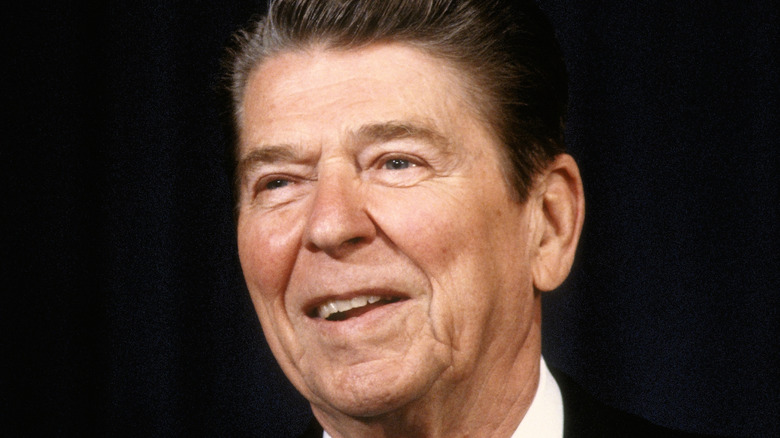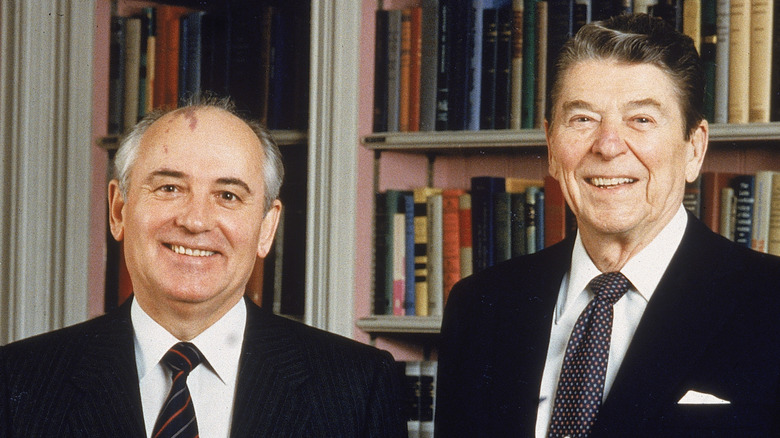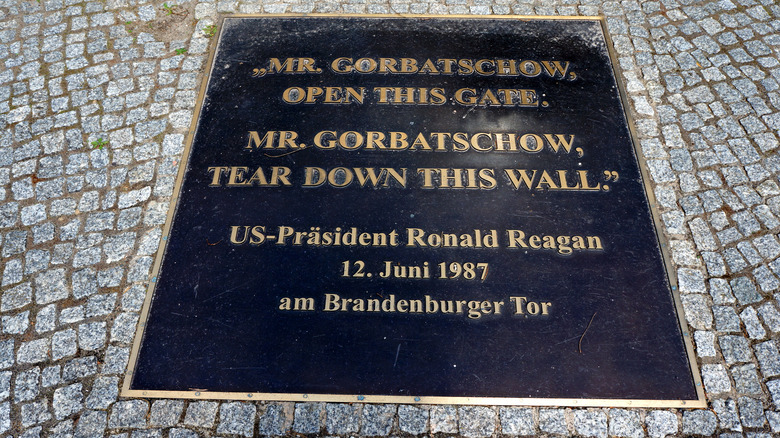Why This Line Was Nearly Cut From Reagan's Famous Berlin Wall Speech
History was made in 1987 when then-U.S.-President Ronald Reagan spoke in front of the Berlin Wall, which had long been a symbol of post-World-War-II Soviet authoritarianism all throughout Europe, per Britannica. Repairing U.S. and Russian relations was a major priority for the Reagan administration, as well as then-Russian-President Mikhail Gorbachev, who supported the policy of "glasnost," or a gradual loosening of Soviet restrictions for a more inclusive and open Russian society. In hindsight, Reagan's speech, and the subsequent destruction of the Berlin Wall, could be seen as a turning point toward the end of the Soviet Union. One of the most well-known lines from the speech, though, was almost left out.
It wasn't the first time a sitting U.S. president would speak at the Berlin Wall. The first time it happened was in 1963, when then-U.S.-President John F. Kennedy delivered an address that would become known as the "Ich bin ein Berliner" speech. At that point, the wall had only just been recently built, and Kennedy's objectives were much the same as those of Reagan: to signal to the world that western democracies stand in solidarity with the people of then-autocratic Eastern Europe. Just like Reagan, Kennedy's historic talk had one famous line above all the rest: "Ich bin ein Berliner," which roughly translates to "I am [also] a citizen of Berlin," according to History. When it came time for Reagan to deliver his address, he wanted his words to have a similar impact.
Background on the Berlin Wall
The Berlin Wall was an auspicious location for Reagan and Kennedy to deliver their speeches, decades apart but addressing similar geopolitical tension. The wall had been built in the aftermath of World War II, when the Allies divided up Germany between the Soviet-influenced East Germany and the democratically aligned western part of the country. The capital itself was divided in half, and the wall marked the point when citizens of Berlin were no longer neighbors. And from 1961 until the wall came down shortly after Reagan delivered his address, it was illegal for East German citizens to travel across that border, according to History. Reagan and Russian President Mikhail Gorbachev are pictured above.
By 1987, after decades of tension between the Western world and the Soviet bloc in a period that would come to be known as the "Cold War," things were improving. Progress between the U.S. and Russia remained tenuous, though. On one hand, the Reagan administration hoped his address at the wall might provide further incentive for the East German government to finally make the wall a thing of the past to reunite the citizens of East and West Germany for good. This could also deliver the final blow to Soviet influence in the region. For that reason, each word Reagan would say was carefully scrutinized, including one line in the text that the whole speech would one day become known for, according to the National Archives.
Reagan almost left out 'Tear down this Wall'
The lead-up to Reagan's April 1987 speech was no small affair, as is the case whenever a sitting U.S. president travels abroad. In this instance, though, the fate of the world could hang in the balance. For this reason, Reagan's advisors warned that his talk should refrain from too much negativity about the USSR, nor should it present the U.S. and other Western liberal democracies in too dramatic a fashion, or even directly target the Berlin Wall itself. One misstep, it seemed, and all the progress made through glasnost and other diplomatic initiatives could revert to the height of Cold War tensions, via the National Archives.
It was decided early on, though, that ending the wall would be the central focus of the speech, and speechwriters tried out different ways of expressing that, including "bring down the wall," as well as many different variations on how to address the line directly to Russian President Mikhail Gorbachev. Given the diplomatic climate at the time, many State Department officials and advisors to the president found calling for the wall to come down too aggressive, and even un-presidential. Nevertheless, the line would stay in its final form: "Mr. Gorbachev, tear down this wall!" which would happen shortly thereafter (via Britannica). As one of Reagan's speechwriters remembers it, "Once the wall fell, the speech seemed to have summed up and even predicted the final phase of the Cold War" (via Stanford).


